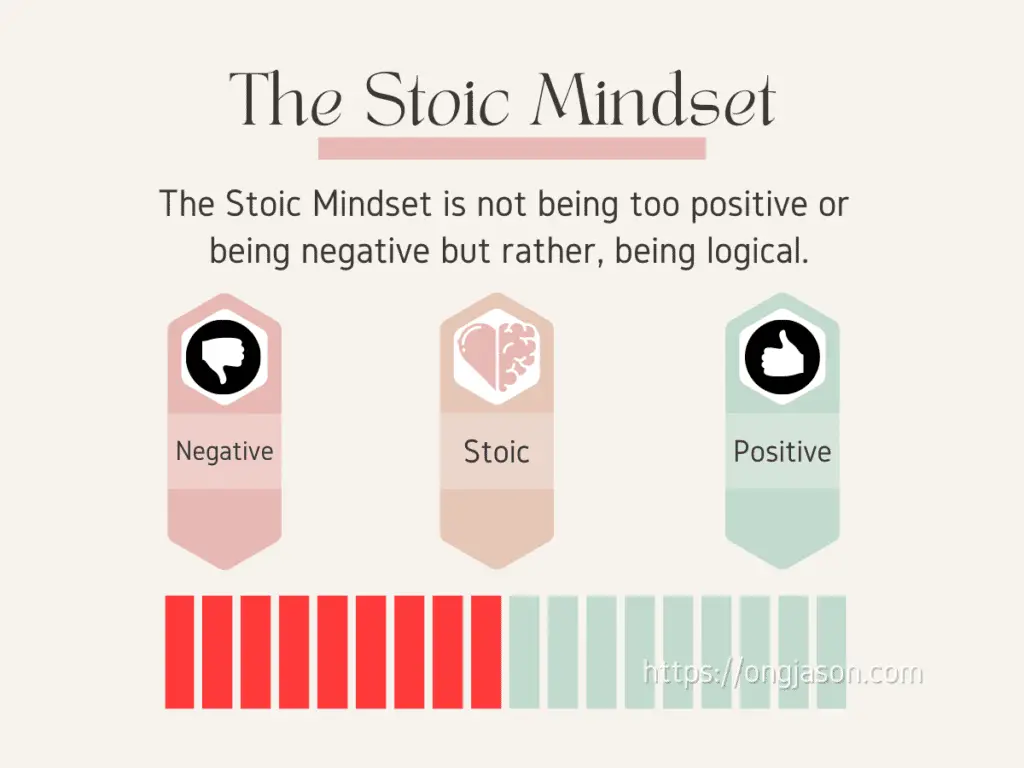The Mindset of Stoics | What is a Stoic Mindset and How to Attain it
Stoicism, an ancient philosophy that has been around for thousands of years, is a way of life that has the individual follow four virtues to live a life of tranquility. The philosophy is about mastering our emotions with the help of mindset. As someone that has benefitted from the change of mindset Stoicism offers, I can attest to how effective it is in living a more peaceful life. So the question is, what is a Stoic mindset in a nutshell?
The Stoic mindset is a mental attitude that helps us remain logical and resilient despite life’s unpredictability. It focuses on the things we can control and not minding the things we can’t control. Using this mindset, we can train our minds to find positive perceptions instead of negative ones.
In this blog post, I will introduce you to the Stoic mindset, how it can make us happy, and how to get the Stoic philosophy.

What is a Stoic mindset?
The Stoic mindset is not being too positive or negative on our thoughts. Instead, it is being rational and handling the things we can control. By being logical, we can find positive perceptions despite the negative things around us and vice versa.
Many people say that mindset is key to a successful life, and I can attest that having a proper mindset is a life changer.
But first, to keep us in the same book, let’s define what’s mindset.
According to Meriam Webster, mindset is a mental attitude or inclination. It is how our mind perceives our environment.
So, mindset is our ability to perceive or define the things that are happening around us.
To explain what mindset is, here is an example.
Suppose we are new in a city and are finding an apartment to rent. A person with a negative mindset can complain about how miserable their life is and how they’re having difficulty finding an apartment in a busy city.
Someone with a good mindset can have the same situation but see this as an opportunity to travel and enjoy their environment.
As you can see, even if we have the same situation, our mindset is the one that decides if what’s happening is good to us or not.
Another example is having enough food to eat. People can be delighted since they perceive food as a blessing, while someone complains about having the same food every day.
Generally speaking, that’s what mindset is. It is our ability to positively or negatively perceive the things that are happening around us.
The fantastic thing is that the concept explaining that our perception is directly correlated to our experiences was explained by ancient Stoics 2 thousand years ago.
Stoicism offers us a way to change our perspective from negative to positive as we learn how they trained their minds to see things logically.
The Stoics believe that it’s not our experiences that cause the problems but how we perceive them.
Like the example above, many things in life can change once we have a Stoic mindset. First, however, it would be best to understand that Stoicism is not all about having a positive attitude.
Stoics are realistic, and they know that there are times a positive mindset is not ideal. However, there are times where we are being too optimistic, which isn’t also ideal.
Instead, we should have a logical way of thinking or mindset.
And to handle these perceptions logically, we should have a deeper look into Stoicism which I’ll talk about in the next section.
How the Stoics mindset makes us happy
The Stoic mindset makes us happy by helping us refocus our attention on the things we can control. By focusing on what we can control, we can finally feel in control of our lives. Furthermore, Stoicism teaches us to live according to nature, which helps us accept reality despite its unpredictability.
Now that you understand what mindset is and how it can affect our lives, we are going deeper into Stoicism and how it reshapes our perspective.
Basically, Stoics are people who always try to stay logical. This means we will not talk about always keeping a positive mindset even though everything around you is crumbling. That is not Stoicism; however, Stoics have ways to be resilient in those types of situations.
One of the main lessons we can learn from Stoics is understanding the dichotomy of control, which means that there are things we can and can’t control.
Everything that happens around us falls into one of the two categories. When the thing is inside our control, we should work to solve it, and if it isn’t in our control, we should not mind them.
To give an example, let’s say you hate the snow because it’s cold and you can’t do anything other than stay inside your house.
The Stoics believe that the weather is outside our control. Thus, instead of stressing about how miserable our life is because of the weather, we shouldn’t mind the snow and instead focus on what we can control, such as preparing a heater and winter clothing.
By doing this, we begin to see that life isn’t that bad since there will always be things we can control, such as our present thoughts and actions.
The Stoics are also deterministic in which they believe in fate. This is also related to the dichotomy of control.
For example, the weather is predetermined, and no matter how stressed we are about it, it will always change.
Thus, instead of being negative on these occasions, we should not mind them and focus on what we can do. That way, we reacted to the problem logically.
I talked about the Stoic’s view of fate in another blog post. If you’re interested, you can check it here: Do Stoics believe in fate?
In the next section, we will dive more into the Stoic mindset, but as of now, I believe you already have a general understanding of Stoicism. Yes, their philosophy is simple, and there is no benefit in complicating it.
How do you get a Stoic mindset?
Generally speaking, you can get a Stoic mindset by understanding and applying the dichotomy of control. The dichotomy of control is a Stoic concept talking about focusing on the things we can control and not mind the things we can’t control. When we classify the things around us like this, we practice the Stoic mindset.
Right now, you already understand the concept of the dichotomy of control.
First, check the things happening if it is within your control or not. If it is, do something about it following the four Stoic virtues. If the thing isn’t in your control, it is best not to mind them and find things you can do.
Almost all of us have bad past experiences, and I believe it’s a good example.
Following the dichotomy of control, there is no use contemplating it since we can’t change the past. It has already happened, and we can’t travel back in time to change the past.
Because of that, a Stoic mindset should not care about the past. Instead, do something in the future to prevent the same mistake from happening again.
For instance, when we experience a breakup, it can be tempting to blame ourselves for what we did wrong and see everything as negative. However, others can also see it as only positive since they are free to date anyone they want once again.
However, the Stoic mindset is in the middle, where we shouldn’t care about what already happened since it’s already done and instead focus on what we control, such as improving ourselves and finding our faults to get better in the future.
Notice how the Stoic mindset puts you in control of your life instead of complaining about it? That’s the beauty of Stoicism.
The Stoic mindset is not purely positive or negative. Instead, it is realistic, and it has helped me cope with life. I hope it does to same to you.
What’s next? Now that you understand the Stoic mindset, Do you want to know what a Stoic person is like? I made a blog post talking about the topic, and I believe it is a good read after this blog post: What is a Stoic person like?

“Only the things I love.“
ongjason.com is reader-supported. When you buy through links on the site, I earn an affiliate commission.
If you’re following me, you’ll know that I believe it is essential to have some tools, whether it’s for personal development or lifestyle in general.
So, here are the things I love.
YouTube
If you want to learn things for free, I recommend watching my YouTube Channel. Click the Button Below to go straight into my Channel. 🙂
Okay, let me first explain my Channel.
I believe that I really can’t explain everything too well on my blog. That’s why I created a YouTube Channel so I can easily explain a lot of things. Plus, I believe that Video Sharing is the future.
Recommended Books
The next thing is books. Books are, for me, one of the cheapest ways to get invaluable information. We can learn personal development, finance, career, relationships, and many more from books.
Here, I will be listing my favorite books in different categories.
- For Beginners – 7 Habits of Highly Effective People by Stephen Covey – Personal development has a lot of concepts and ideas to learn. Thus it can be really hard for beginners to know where to start. Thus, I recommend this book since all the basic concepts of personal development are here(except finance, check what I recommended for that)
- Productivity – The One Thing by Gary Keller – This book teaches us the power of focusing on one thing which is the ultimate source of productivity. The concepts taught are what I am using to constantly publish YouTube videos while maintaining this website.
- Busy? – Make Time by Jack Knapp – This book teaches us how to make time for the things we love. The concept is really simple but I think that makes it a book worth reading.
- Health – Lifespan by Dr.Sinclair – This Book teaches about the latest scientific research on lifespan. In his book, he has shared numerous things he is doing to slow down his aging process. This can be as easy as eating less which he recommends.
- Finance – The Richest Man in Babylon by George Clason – Perhaps one of the first books I’ve read about Finance, this book for me is the best if we are talking about learning basic finance such as basic saving and investing. The concepts are very simple but effective.
Audiobooks
Take this advice as a grain of salt.
I don’t recommend buying Audiobooks one by one. I mean, audiobooks can be quickly finished by listening while working out or doing some mindless tasks.
So here is to save you some money. Just go for a monthly subscription to Audible. I believe that you will save a lot of money with that plus, they usually give freebies to anyone starting.
My Audiobook Recommendation will always be the same as my book recommendations, but I personally like The 5 Second Rule by Mel Robbins. I like how she is so casual while reading her book.






